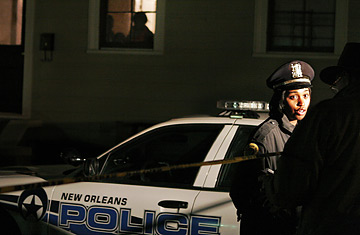
A New Orleans police officer at a location where three men were shot in the Ninth Ward of New Orleans, Thursday, Feb. 15, 2007.
"When I walk my dog, I have a 20-dollar bill in one pocket and mace in the other," says Pedro, referring to "mugger money" she carries to hand over in hopes that an assailant will beat a quick retreat, and spray in case things turn uglier. "I've taken that initiative, but I think I need to go further," she says, citing a string of assaults in her quiet neighborhood near the French Quarter. "I would like to have a visible gun on my hip."
Pedro's roommate nixed that idea. But many New Orleans residents, alarmed by a rising post-Hurricane Katrina murder rate and the city's struggling criminal justice system's failure to stop it, haven't been dissuaded and are following through on the urge to arm themselves. In the first three months of this year, the number of people in New Orleans who were granted permits to carry a concealed weapon more than doubled, to 85, over the same period in 2005 — before Katrina, when the city's population was by most estimates at least twice what it is today. The increase was even starker in neighboring Jefferson Parish, where concealed weapon permit applications shot up 300%.
Since Katrina, weapons sales at Jefferson Gun Outlet in suburban Metairie are up about 40%, says the store's owner, Mike Mayer. And it's not the usual gun hobbyists that are buying. "They're not gun aficionados," Mayer says. "They're just doing it because they feel they have to."
The media is often accused of sensationalizing crime. But that's hardly necessary in New Orleans, which has logged at least 53 homicides since the beginning of the year — the highest murder rate, per capita, in the nation. There were seven unrelated killings in one recent four-day stretch, including four on April 2. National Guard troops and state police have been patrolling city streets since last June. But there appears to be little law enforcement can do to quell the violence, much of which is attributed to turf battles among drug gangs.
It's the random killings, however, like the still-unsolved January murder of filmmaker Helen Hill, that have spurred ordinary citizens to take up arms. Hill was the apparent victim of an early morning intruder at her home near the French Quarter; her killing, and a rash of other murders, prompted an emotionally charged march on City Hall that month.
City officials quickly trotted out a list of anti-crime measures such as late-night traffic checkpoints and crime cameras in hot spots. But a skeptical public is increasingly looking at ways to protect themselves. The topic comes up often in casual party chat and on Internet forums; a typical post on nola.com, the New Orleans Times- Picayune Web site, bears the heading "Armed Citizens Rule!" and reads, "would-be predators flee when a legally carried gun is presented instead of a wallet."
Predictably, such chatter has law enforcement officials concerned. "Not just for our safety or theirs," says New Orleans Police Department sergeant Donovan Livaccari. "But people should know where their rights begin and where they end. I think a lot of people are unaware that, in Louisiana, you can have a weapon in your car, but once you leave your car, you're subject to a whole different set of circumstances. Also, where you're allowed to use deadly force; by law, you're not allowed to use deadly force to protect property."
Livaccari points out that, in a holdup, a gun-waving victim is more likely to end up shot than one who simply hands over money — though his message isn't helped by incidents like one last October in which a would-be victim shot and killed a man he told police was trying to rob him and a female companion at gunpoint near the French Quarter. Then there's the possibility that a gun will be stolen and used in other crimes. But as long as the sense of being under siege persists, such concerns aren't likely to dampen sales of guns, pepper spray, guard dogs and other weapons in New Orleans.
The looming hurricane season is likely to add fuel to the fire; memories of the mayhem that followed Katrina are still fresh, and as in that storm, there will be those who choose to stay and fight rather than evacuate. "We'll see more sales heading into hurricane season," predicts Mayer.
Meanwhile, the storm of violence plaguing New Orleans has residents like Pedro wrestling with potentially life-altering decisions about safety. "I never had to think about getting a gun before," she says. "But if people are coming into your house, what do you do?"
